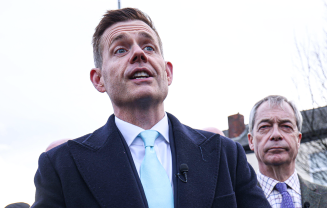
Read our Monthly Magazine
And support our mission to provide fearless stories about and outside the media system
Former MPs including Caroline Lucas are considering whether to appeal a landmark ruling from the European Court of Human Rights that (ECHR) which found the Government had not failed to investigate Russian interference in British politics.
Ex-MPs Ben Bradshaw (Labour), Caroline Lucas (Green Party) and Alyn Smith (SNP) brought a case to the ECHR against the UK Government, arguing that Russia has engaged in “widespread and pervasive” interference in democratic elections in the UK and across Europe.
They argued that the aggressive tactics included “weaponising disinformation” to undermine democratic institutions, deliberate cyber-attacks against key public bodies, including election infrastructure, “hack and leak” operations, and the use of “cyber troops” and “troll farms” to manipulate public discourse and to sow discord between social groups.
Lucas and the other then-MPs told the court there was no public body with the legal responsibility to prevent and combat foreign interference in UK elections, no legal obligation for online political advertisements to indicate who had paid for them (this has now changed), no legal requirement for social media companies to cooperate with security and intelligence agencies, no clear-cut ban on foreign donations to political parties, and no obligation on foreign state agents to register (again, this has since changed).
Don’t miss a story
And they claimed that despite the existence of credible allegations that Russia sought to interfere in the United Kingdom’s democratic processes, the Government “neither investigated those allegations nor put in place an effective legal and institutional framework” to protect against the risk of such interference.
The court accepted that if hostile state interference posed a real risk of impairing the “very essence” of free elections, Governments would be required to adopt “positive measures” to protect election integrity.
The court also found that states cannot remain “passive when faced with evidence that their democratic processes are under threat.”
And the court found there was sufficient evidence of Russian interference of adequate intensity to make the case valid.
Despite this, on Tuesday (22nd July), the court also ruled that the Government had not violated its duties when it came to protecting electoral integrity.
And despite acknowledging “undoubtedly shortcomings in the Government’s initial response,” the court found the UK had conducted two “thorough and independent investigations” into foreign interference through the Department for Culture, Media and Sport, and the Intelligence and Security Committee of Parliament which published the ‘Russia Report’ under Boris Johnson.
ENJOYING THIS ARTICLE? HELP US TO PRODUCE MORE
Receive the monthly Byline Times newspaper and help to support fearless, independent journalism that breaks stories, shapes the agenda and holds power to account.
We’re not funded by a billionaire oligarch or an offshore hedge-fund. We rely on our readers to fund our journalism. If you like what we do, please subscribe.
Since the case was filed, three pieces of legislation were passed – the Elections Act 2022, National Security Act 2023 and Online Safety Act 2023 – which were supposedly meant to limit potential election meddling by foreign powers.
Ministers had also set up the Counter Disinformation Unit and Defending Democracy Taskforce to track and respond to the potential problem.
Caroline Lucas, now president of the European Movement, told Byline Times in an interview following the ruling: “It is significant that the European Court of Human Rights has said the right to free and fair elections is engaged in this case. It’s perfectly reasonable to expect that free and fair elections take place, and foreign interference is a threat to democracy. The Court acknowledged that this means states have a duty to investigate such interference.
“Sadly, they felt the Government had done enough. However, when we brought the case, the Government had done a lot less. We brought the case in 2020 and Boris Johnson only reluctantly released the Russia Report. He showed an extraordinary lack of curiosity about Russian interference.
“Since then, other legislation has been introduced which has [in the court’s eyes] nullified our case. We’d challenge that assessment though – really the DCMS report or the ISC report really examine covert Russian funding.
“They don’t look at investigating Russian interference in Brexit. The ISC report actively avoided asking questions about it – presumably because they were worried about what the answers might have been.”
She added that backers were “now in conversations about next steps.”
“We’re exploring options with [groups like] Transparency International and others. We need to make a strong case that our democracy is still not secure from interference. That’s a case we can still sadly make.”
Even under Labour’s planned Elections Bill, which is set to introduce new safeguards against foreign donations to British parties, nothing currently stops people from donating from abroad.
“There’s the option to appeal, which is something we’re talking about. It’s under active discussion.” Lucas argues the UK is “still wide open to foreign interference.”
“On social media, we don’t know where posts come from. On donations, the system is not as robust as it needs to be.
“The current Government is taking it much more seriously than Johnson did – but that’s a very low bar. There’s more awareness now of just how malign these threats can be. Labour are taking it more seriously than the previous Government, but not seriously enough.”
The case has wider significance not just for the UK but more broadly across Europe, particularly in noting states’ need to have protections in place against foreign interference – though this must be balanced with protections for free speech.
A Government spokesperson said: “We note [Tuesday’s] judgment, which found no violation.
“We are committed to safeguarding our electoral processes, which is why we recently announced tougher new rules on political donations to protect our elections from the growing danger of foreign interference. These changes will boost transparency and accountability in politics by closing loopholes that would allow foreign donors to influence elections.
“More broadly, national security is our first responsibility, and we have taken action to harden and sharpen our approach to threats – whether standing with Ukraine against Russia’s illegal invasion of Ukraine, placing Russia on the enhanced tier of the Foreign Influence Registration Scheme, and working with allies to monitor and counter Russian submarines and ships in UK waters.”
The case was brought under Article 3 of Protocol No. 1 of the Human Rights Act, which enshrines the European Convention on Human Rights into UK law. The protocol is meant to ensure citizens benefit from elections held “under conditions which ensure the free expression of the opinion of the people.”
holding farage to account #reformUNCOVERED
While most the rest of the media seems to happy to give the handful of Reform MPs undue prominence, Byline Times is committed to tracking the activities of Nigel Farage’s party when actually in power
With thanks to our readers as ever for story tips. Do you live in a Reform-run council area? Get in touch in confidence on josiah@bylinetimes.com








